UT’s Undergraduate Research & Fellowships announced two undergraduate Volunteers have been named finalists for the Truman Scholarship. Summit Wright and Grace Hardin were two of 193 finalists chosen from 709 applications from 285 schools.
Uncategorized
UT’s Camponovo Recognized as Campus Career Champion
Michael Camponovo has been recognized for this work with electromagnetic radiation, but it’s his work as director of UT’s GIS Outreach & Engagement Laboratory that has earned him the recognition of Campus Career Champion by the Center for Career Development & Academic Exploration. As director, Camponovo fosters interest and excitement about GIS and geospatial technologies while encouraging Vols to pursue a career in geography.
UT Announces 2023 EURēCA Winners
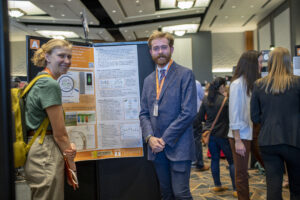 The Exhibition of Undergraduate Research and Creative Achievement (EURēCA), led by Undergraduate Research & Fellowships in the Division of Student Success, took place on April 25, 2023.
The Exhibition of Undergraduate Research and Creative Achievement (EURēCA), led by Undergraduate Research & Fellowships in the Division of Student Success, took place on April 25, 2023.
This year’s event was hosted in UT’s Student Union with 1,179 students showing 868 projects from a wide range of disciplines and methodologies. On May 4 during a closing awards ceremony, participating colleges presented a total of 161 awards for excellence in undergraduate research and creative achievement. Nine colleges and the Baker Center for Public Policy were represented with students from over 56 departments participating.
Two UT Students Receive Lumsden-Greenberg Excellence in Career Management Award
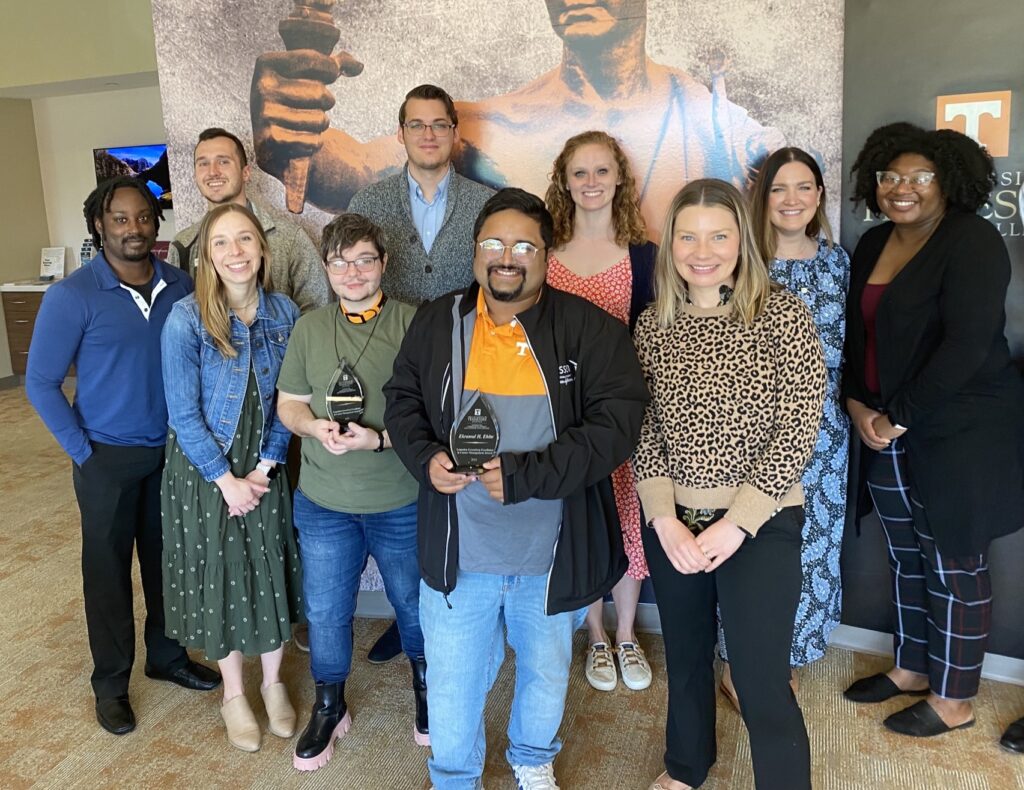
Nathaniel Bradley with members of the CCDAE team receiving his award.
One undergraduate and one graduate student recently received the Lumsden-Greenberg Excellence in Career Management award. Nathaniel Bradley is a senior in English with a concentration in technical writing and a Wildlife and Fisheries management minor. The graduate student awardee was Ekramul H. Ehite, a graduating PhD student in biosystems engineering.
Faculty Fellows Cultivating the Volunteer Experience across UT
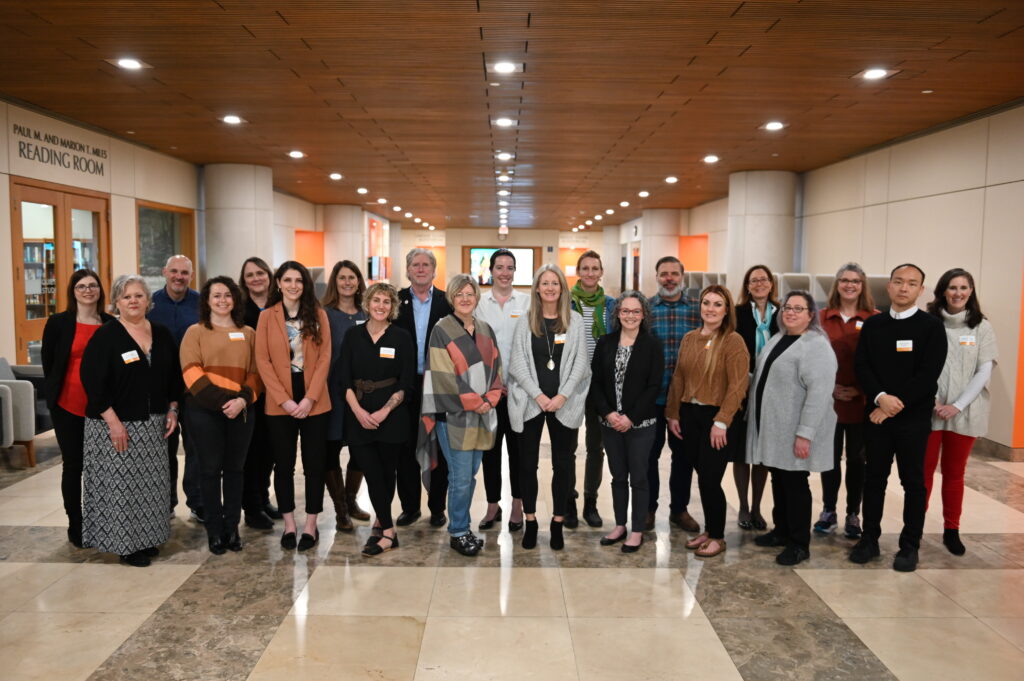 Goal area one of the university’s Strategic Vision, Cultivating the Volunteer Experience, calls for collaborative and experiential educational opportunities that are responsive to the needs of learners. While many efforts are being lifted to respond to this call, one unifying strategic investment that UT has named is a sustained focus on our scholars’ well-being.
Goal area one of the university’s Strategic Vision, Cultivating the Volunteer Experience, calls for collaborative and experiential educational opportunities that are responsive to the needs of learners. While many efforts are being lifted to respond to this call, one unifying strategic investment that UT has named is a sustained focus on our scholars’ well-being.
UT Hosts Second Annual Career Outcomes Summit
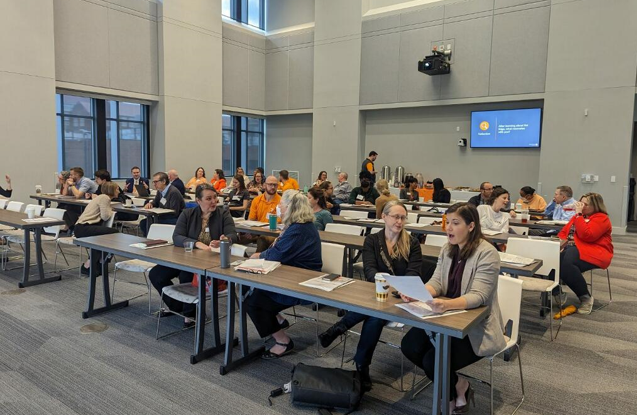
Members of the Volunteer community gathered Friday, March 3 for the second annual Career Outcomes Summit in the University of Tennessee, Knoxville, Student Union.
Stephanie Kit, executive director of the Center for Career Development & Academic Exploration, presented data from 2021-2022 graduates on their post-UT outcomes while Dr. Amber Williams, Vice Provost for Student Success, welcomed the panel while also offering closing remarks.
“It was a pleasure to hear directly from our faculty about the nuanced ways they integrate career-readiness into their curriculum. These intentional moments help scholars connect their classroom experiences to their future careers.” said VPSS Williams.
Highlights included a 90% positive career outcome rate for the 2022 graduating class, the highest in UT history. Positive career outcomes are defined as obtaining employment, attending graduate or continuing education, performing military service, or working with a service organization.
Overall, 60% of students who did achieve employment are employed in-state, with a $56,624 mean salary, while 70% completed an internship or similar experience. Top employers include: The University of Tennessee, PepsiCo/Frito-Lay, Pilot Flying J, UT Medical Center, and the Vanderbilt University Medical Center.
During the summit each faculty member, from a variety of colleges and departments, shared ways in which they include career in their curriculum, ranging from hands-on projects that involve employers and community organizations to assignments that allow students to connect what they’re learning in their major classes to the career competencies they are building.
Ultimately the faculty panel’s main goals are helping students to be better prepared to solve the challenges they will encounter in the workforce.
The Faculty Panel consisted of:
• Dr. Leonard Clemons, Associate Vice Provost for Student Success
• Dr. Erin Darby, Associate Professor, Religious Studies and Faculty Director, Undergraduate Research & Fellowships
• Dr. Julie Ferrara, Assistant Department Head and Lecturer, Business Analytics & Statistics
• Dr. Laura Knight, Assistant Professor, Outreach & Engagement Coordinator, Industrial and Systems Engineering
• Ms. Ashleigh Powers, Coordinator of Academic Advising, Psychology
• Ms. Cary Staples, Professor, Graphic Design
• Dr. Liz Derryberry, Associate Professor, Ecology & Evolutionary Biology
Sponsored by the Division of Student Success and the Center for Career Development & Academic Exploration, the Summit connects faculty and staff at UT with information on students’ post-graduation outcomes to evaluate their success while at college. The data collected from the career profile enables UT to improve academic and student success initiatives that support scholars as they set and achieve their post-graduation goals, securing employment or continuing education. This strategy aligns with UT’s Strategic Vision, particularly Goal One of cultivating the Volunteer Experience.
The Center for Career Development & Academic Exploration utilizes multiple outlets for getting career outcomes and collects this data for up to six months after graduation. These include attending on-campus events to gather information, participating in calling campaigns, and researching online outlets such as LinkedIn for post-graduation outcomes. National Association of Colleges and Employers (NACE) provides career outcomes guidelines for higher education institutions on collecting and reporting post-graduation career outcomes.
The center also recently rebranded their What Can I Do With This Major? website. This additional resource features major-specific profiles with information on common career paths, employers in that field, and strategies to maximize opportunities.
Vols Travel to Nashville for Posters at the Capitol
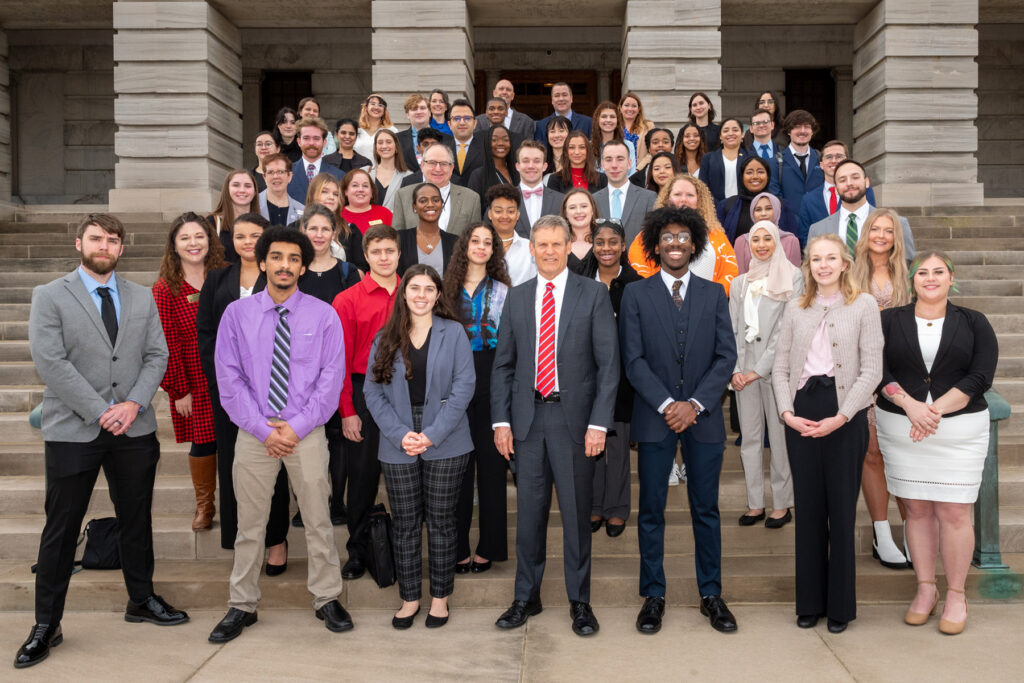
University of Tennessee, Knoxville, student scholars recently traveled to the Tennessee Capitol to present their undergraduate research projects to state legislators as part of the annual Posters at the Capitol. The event provides students exposure and access to state leaders and legislators, including Governor Bill Lee who addressed the students to open the poster exhibition.
“I expanded my network by meeting other undergraduate researchers while sharing incredibly important entomological research with Tennessee’s state representatives.” Kathleen Coffman, a senior majoring in plant sciences, said. “This opportunity inspired me to continue communicating science to people of all backgrounds and educational foundations.”
The student scholars who participated were:
- Kathleen Coffman, Senior, Plant Sciences, Presented: Zombie Ant Fungus: It’s Now Among Us, Faculty Sponsor: Dr. J.F. Grant
- Madlen Conley, Junior, Geography, Presented: Exploring the Dendrochronological Potential of Eastern Red Cedar Trees at the McGhee-Carson site, Vonore, Tennessee, Faculty Sponsors: Dr. Matthew Kerr & Dr. Jaqueline Kerr
- Tony George, Senior, Biomedical Engineering, Presented: Experimental Study of Aspiration Catheter Removal for Ischemic Strokes, Faculty Sponsor: Bryan Good
- Gillian Hertslet, Junior, Biological Sciences, Presented: Investigation into the Conformational Dynamics of Glucagon Receptor using Single-Molecule Fluorescence Microscopy, Faculty Sponsor: Rajan Lamichhane
- Jada Laws, Senior, Psychology, Presented: Prenatal Wellness Interventions’ Influence on Postpartum Contraceptive Plans, Faculty Sponsor: Jill Maples
- Hannah Morris, Senior, College Scholars (Education Reform and Policy), Presented: Play and the Built Environment: An Interdisciplinary Examination of Children’s Access to Play in Knoxville-Knox County, Faculty Sponsor: Professor Michael Camponovo & Dr. Margaret Quinn
- Tyler Myers, Sophomore, Microbiology and Neuroscience, Presented: Investigating Dopamine Modulation by Bacterial Symbionts in Entomopathogenic Nematodes, Faculty Sponsor: Dr. Heidi Goodrich-Blair
- Caleb Napper, Senior, Civil and Environmental Engineering, Presented: Analysis of Alternate Binder Properties in Optimized Concrete, Faculty Sponsor: Dr. John Ma
- Breanna Polen, Senior, Food Science, Presented: Listeria monocytogenes: Survival of the Fittest!, Faculty Sponsor: Doris D’Souza
- Ellie Pritchard, Senior, Neuroscience, Presented: Advancing Neurodegenerative Disease Research using Brain Slice Culture, Faculty Sponsor: Dr. Rebecca A. Prosser
- Skylar Sopko, Senior, Nursing, Presented: Correctional Nurses’ Perceptions of Substance Use Withdrawal Treatment for Pregnant Women in Jail in the South-Central Appalachia Region, Faculty Sponsor: Sadie Hutson & Dr. Carrie Lingerfelt
Before traveling to Nashville, Undergraduate Research & Fellowships hosted an orientation to help scholars refine their posters and presentations. Christie Kennedy, director of research marketing and communications for UT’s Office of Communications & Marketing, presented to the scholars about how to effectively communicate their research to a broader audience. David Smith, director of external affairs for The Howard H. Baker Jr. Center for Public Policy, advised the students about how the students can contribute to statewide efforts to translate academic research into real-world policymaking.
In addition to our Vols, students from the University of Tennessee at Martin, University of Memphis, Austin Peay University, East Tennessee State University, Tennessee State University, and Middle Tennessee State University, the organizer of the event, also presented. The Tennessee Board of Regents and University of Tennessee System hosted the event.
Provost & Student Success Promote Faculty Grants
The Office of the Provost is continuing to lift initiatives related to the Volunteer Experience, as articulated in goal one of the Strategic Vision. This comprehensive, university-wide approach promotes student well-being inside and outside the classroom. One effort in that approach is establishing academic department Student Success Grants to support the integration of well-being pedagogy in priority, high-enrollment courses.
The first grant, awarded in fall 2021, supported the Division of Biology’s Biology Booster Shot project and was submitted by co-applicants, Dr. Randall Small and Dr. Caroline Wienhold. The Biology Booster Shot project seeks to improve student success in the 100-level introductory biology courses, specifically BIOL 150 and 160, and the grant was funded for two years.
In addition to continuing support for the Biology Booster Shot project, the Office of the Provost and the Division of Student Success have funded two additional Student Success Grants that launched in fall 2022, in the Department of Engineering Fundamentals and the Department of English.
Co-led by Dr. Erin McCave and Dr. Darren Maczka, the Engineering Fundamentals department was awarded $30,000 to support the Developing Self-Efficacy and Confidence Among Pre-Calculus Engineering Students grant. The grant targets multiple goals, focusing first on increasing student scholars’ self-efficacy regarding math and physics concepts. Additionally, the faculty team seeks to develop students’ skills related to academic stress management, self-awareness regarding classroom performance, and self-regulated learning strategies.
According to McCave and Maczka, first-year engineering students face multiple hurdles and can be overwhelmed, especially with a lack of confidence while taking certain courses. “By directly supporting well-being skills and developing self-efficacy within the Engineering Fundamentals curriculum, we help this population of students thrive when previously many left the college before making it to their first engineering course,” they said.
On behalf of the English department, Dr. Sean Morey, Dr. Jeff Ringer, and Doctoral Candidate Megan Von Bergen submitted a grant titled, Equitable Assessment in First-Year Composition. This grant, which was awarded $60,125, is designed to rethink grading practices in ways that reflect equitable approaches to writing assessment and to provide continuity for these practices in the writing program. An example of equitable writing assessment is labor-based grading, which bases grades partly on the labor students put into the course and assignments, such as drafting, revising, self-assessment, and reflection.
“Equitable assessment practices go a long way towards meeting students where they are as learners and engaging them in practices –– metacognition and reflection –– that contribute to their growth, no matter where they start,” Dr. Morey said.
The success grant initiative is a collaborative partnership across multiple units. Dr. Sally Hunter, faculty member in Child and Family Studies, serves as the Volunteer Experience faculty director, coordinating efforts related to the success grants as well as the Volunteer Experience faculty fellows program. Dr. Patrick Biddix, who serves as professor and program coordinator in the Higher Education and Administration program, leads the assessment and research activities relevant to the success grant program. Dr. Virginia Stormer, the associate director for curriculum development and design in the office of Teaching and Learning Innovation, serves as a key facilitator of the success grant project, providing professional development, curricular redesign support, and partnership on research initiatives.
“Faculty-led success grants are helping us achieve our goal of seeing each student persist and graduate,” said Provost John Zomchick. “It’s great to see our Division of Student Success working together with faculty and departments to bring new approaches to learning and thriving to our student scholars.”
UT Hosts Pizza Pop-Ups Before Finals
 UT’s Academic Success Center and other campus support offices including One Stop Student Services and academic advising will host Pizza Pop-Ups on December 5 and 6 to offer assistance as our student scholars prepare for finals.
UT’s Academic Success Center and other campus support offices including One Stop Student Services and academic advising will host Pizza Pop-Ups on December 5 and 6 to offer assistance as our student scholars prepare for finals.
Each Pizza Pop-Up will be college specific and tailored toward fall 2022 first-year and transfer students. Below are the Pizza Pop-Ups for scholars within the Tickle College of Engineering, the College of Arts & Sciences, and the Herbert College of Agriculture.
- Arts & Sciences Pizza Pop-Up: Monday, December 5 from 6 p.m.-7:30 p.m. (Strong Hall Atrium)
- Herbert College of Agriculture Pizza Pop-Up: Tuesday, December 6 from 3:30 p.m.-5 p.m. (Brehm Animal Science Building)
- Tickle College of Engineering Pizza Pop-Up: Tuesday, December 6 from 6 p.m.-7:30 p.m. (178 Zeanah)
UT’s Summer 2022 Congressional Interns Announced
With plans to make their own impact on the world, 10 University of Tennessee students will take on Washington D.C. after securing internships with the United States Congress through the Congressional Internship Program (CIP). The summer program runs anywhere from six to 10 weeks during which the students work closely with legislative staff on a variety of projects. 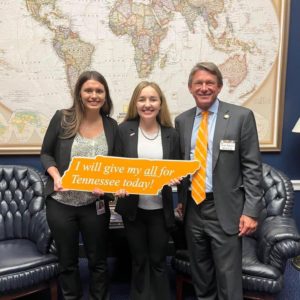
Current interns, Cierra Potter and Savannah Jones, shared their experiences living and working in D.C. through the program. “I have already gained so much knowledge about how congress really works,” Potter said. “I feel like I learn something new every day while being here, sometimes it’s about policy, sometimes it’s about politics, and sometimes I learn things just about the professional world in general.”
Both emphasized the importance of using the career center as a resource and not being shy to “just go for it” when it comes to applying for new opportunities and expressed how much they are learning already.
“I’m learning new things every day and meeting so many new people,” Jones said. “Every day is different. I answer constituent calls, make callbacks, draft communications, give tours of the capital, attend briefings, do research for the legislative assistants, and meet with visitors who come to the office.”
The Congressional Internship Program gives students from all majors with an interest in government, public policy, and Capitol Hill careers the opportunity to see the inner workings of Capitol Hill.
“We’ve had students from nearly all of UT’s colleges participate in the CIP over the years and find value in the experience,” Stephanie Kit, executive director of the Center for Career Development & Academic Exploration, said. “The CIP provides a great opportunity for students to experience a congressional office firsthand and explore their career goals. One of the most valuable takeaways from the experience is building a network of contacts that can help with future career plans.”
The summer 2022 Congressional Internship Program interns and the offices where they are working:
- Meredith Bailey: Class of ’23, majoring in political science, Congresswoman Harashbarger
- Robert Fieldan Bowman: Class of ’24, majoring in finance, Congressman Burchett
- Garrett Everett: Class of ’23, majoring in political science, Congressman Burchett
- Savannah Jones: Class of ’23, majoring in agricultural economics, Congressman Desjarlais
- Abigail Lawrence: Class of ’23, majoring in geography, Congressman Burchett
- Cierra Potter: Class of ’23, majoring in psychology, Congressman Desjarlais
- Shrujana Senthil: Class of ’24, majoring in political science, Congressman Cohen
- Sarah Sexton: Class of ’23, majoring in English, Congressman Rose
- Noah Smith: Class of ’23, majoring in supply chain management, Senator Hagerty
- Catelyn Williams: Class of ’22, majoring in political science, Congressman Cohen
Students can learn more about the Congressional Internship Program and how to apply through the Center for Career Development & Academic Exploration. Members of the CIP committee interview selected applicants. If chosen for the program, students must apply to all Tennessee congressional offices they wish to intern with. Once their offer and internship are secured, they will receive funding from the career center to offset the costs of living in Washington D.C.
Contact:
Lacey Wood (laceywood@utk.edu)
Riya Patel (rkh814@vols.utk.edu)